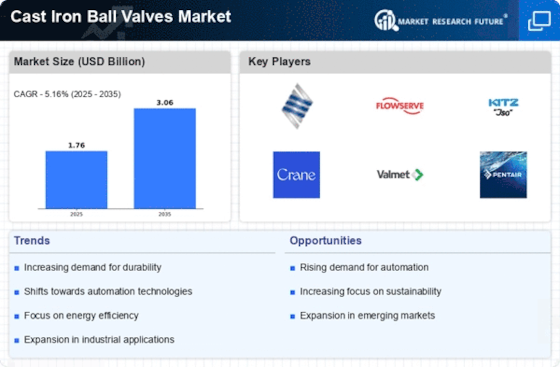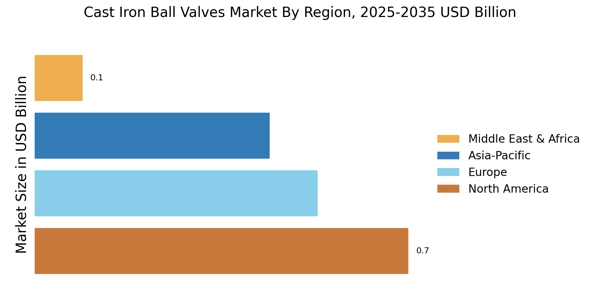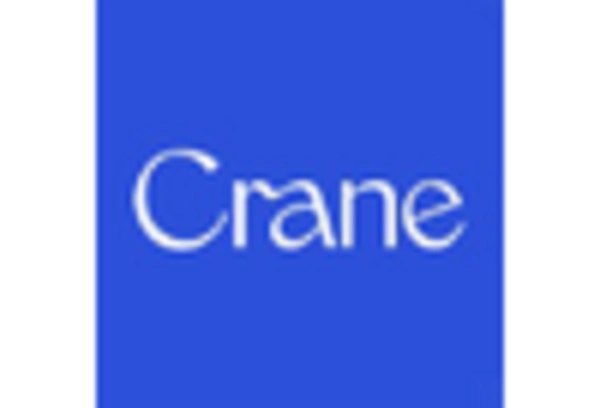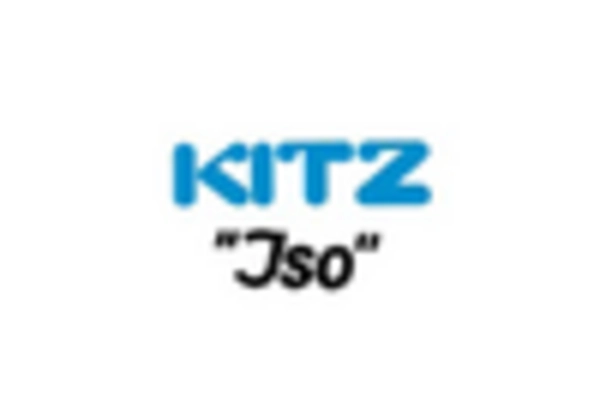Growing Focus on Energy Efficiency
The Cast Iron Ball Valves Market is increasingly influenced by a growing focus on energy efficiency across various sectors. Industries are under pressure to reduce energy consumption and minimize operational costs, leading to a heightened demand for energy-efficient valve solutions. Cast iron ball valves, known for their durability and low maintenance requirements, are becoming a preferred choice for applications where energy efficiency is paramount. The energy efficiency market is projected to grow significantly, with investments in energy-saving technologies expected to reach USD 500 billion by 2027. This trend is likely to drive the adoption of cast iron ball valves, as they contribute to overall system efficiency and sustainability, thereby enhancing their market appeal.
Technological Innovations in Valve Design
The Cast Iron Ball Valves Market is benefiting from ongoing technological innovations that enhance valve design and functionality. Advances in materials science and engineering have led to the development of cast iron ball valves that offer improved performance characteristics, such as higher pressure ratings and better sealing capabilities. These innovations are crucial for industries that require precise control over fluid flow and pressure management. The integration of smart technologies, such as IoT-enabled valves, is also gaining traction, allowing for real-time monitoring and predictive maintenance. As these technologies become more prevalent, the demand for advanced cast iron ball valves is likely to increase, positioning the market for substantial growth in the coming years.
Regulatory Compliance and Safety Standards
The Cast Iron Ball Valves Market is significantly influenced by stringent regulatory compliance and safety standards across various sectors. Governments and regulatory bodies are increasingly enforcing regulations that mandate the use of reliable and safe valve systems in critical applications. For instance, industries such as oil and gas are required to adhere to safety protocols that necessitate the use of high-performance valves to prevent leaks and ensure operational integrity. This regulatory landscape is likely to propel the demand for cast iron ball valves, as they are recognized for their robustness and reliability. As industries strive to meet these compliance requirements, the market for cast iron ball valves is expected to expand, reflecting a growing emphasis on safety and quality.
Industrial Growth and Manufacturing Expansion
The Cast Iron Ball Valves Market is poised for growth as industrial sectors expand and modernize. Industries such as oil and gas, chemical processing, and power generation are increasingly adopting advanced valve technologies to improve operational efficiency. The Cast Iron Ball Valves Market is projected to grow at a CAGR of around 5% from 2023 to 2028, indicating a robust demand for reliable and durable components like cast iron ball valves. These valves are essential for controlling fluid flow in high-pressure environments, which is critical for maintaining safety and efficiency in industrial operations. As manufacturing processes evolve, the need for high-quality cast iron ball valves is expected to rise, further driving market growth.
Rising Demand in Water and Wastewater Management
The Cast Iron Ball Valves Market is experiencing a notable increase in demand driven by the growing need for efficient water and wastewater management systems. As urbanization accelerates, municipalities are investing heavily in infrastructure upgrades to ensure reliable water supply and treatment. This trend is reflected in the projected growth of the water and wastewater sector, which is expected to reach a market size of approximately USD 1 trillion by 2026. Cast iron ball valves are favored for their durability and resistance to corrosion, making them ideal for handling various fluids in these applications. Consequently, the rising focus on sustainable water management practices is likely to bolster the demand for cast iron ball valves, thereby enhancing their market presence.

















